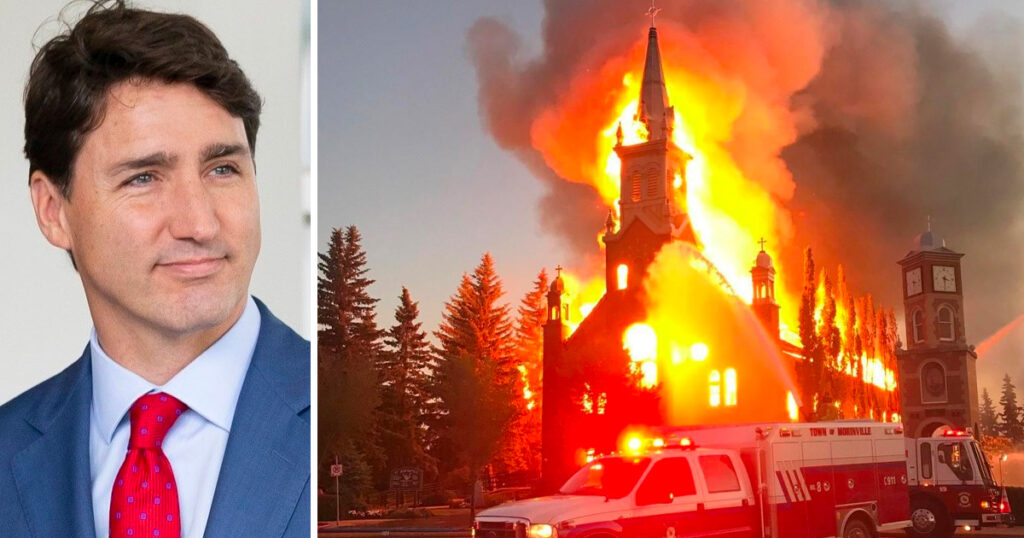Canadian Politics
The anti-Christian bigotry of the Canadian elites
The last remaining acceptable bigotry in Canada is anti-Christian bigotry.
This has been true for years but has become particularly pronounced during the tenure of Trudeau the Younger. Why, for example, can over 100 Canadian churches get vandalized and torched in four years – 33 of them burning to the ground – without any sort of systematic response from Canada’s government?
If over 100 mosques had been attacked, what would Trudeau’s response have been? I think we know. Indeed, when 68 churches had been attacked, Trudeau appointed… a special representative to combat Islamophobia. As I noted earlier this year, many of the Canadian elites shrug off the church-burnings because although they may oppose the methods of the arsonists, they largely agree with the sentiments.
Indeed, when Canadian Christians get any press coverage at all, it is almost always because the media wants to draw attention to what Christians oppose – LGBT ideology, or abortion, or pornography, for example. The Canadian press has made a habit of covering 2,000-year-old Christian beliefs as if they are somehow news – all for the purpose of portraying Christians as mean, small-minded people who oppose Canadian values.
It is not news that Christian institutions generally adhere to a Biblical view of sexuality, for example, but Canada’s state broadcaster and major newspapers treat us to an endless stream of breathless coverage reminding us of the fact.
You have probably never heard about the community service work done by staff and students at Redeemer University. You probably have heard the stunning revelation that, as one CBC headline put it, this “private Christian university says no sex outside heterosexual marriage.” Progressive politicians and their media allies have put a lot of elbow grease into stereotyping conservative Christians, and it has been effective.
Consider another example. Canadian politicians regularly campaign in immigrant communities and places of worship. Photo ops of politicians in Islamic communities sporting hijabs or in Sikh temples wearing head-coverings are standard campaign fare; showing overt respect to the various religious traditions and holidays of Canada’s ethnic communities is a key aspect of coalition-building. Meanwhile, the press and politicians scrupulously avoid asking these religious leaders about their views on homosexuality or abortion.
Contrast that with a July 5 headline by David Akin of Global News: “In groundbreaking move, Poilievre campaigns among evangelical Christians.”
Why is this “groundbreaking”? Why does campaigning amongst Canada’s Muslims, Hindus, and Sikhs considered the norm – but a politician showing up at a church is treated as if he visited a leper colony with a bad outbreak of whooping cough? Akin writes:
But observers say these visits are also groundbreakers if only because leaders of mainstream Canadian political parties have long avoided public events with evangelical Christians for fear those appearances might become a political liability.
“The trick is to do that without being tarred with the brush that you are an extremist, that you’re an American-style Christian right ideologue, which I think is toxic in Canadian politics,” said sociologist Lydia Bean, the author of the 2014 book The Politics of Evangelical Identity: Local Churches and Partisan Divides in the United States and Canada. Even Stephen Harper — a member of an evangelical church himself — avoided public association with evangelical Christians due to political considerations.
This, it must be noted, is a neat trick. The media, which takes great care to buttress progressive claims that Canadian Christians are “American-style ideologues,” notes that campaigning in Canadian churches is controversial because doing so means running the risk of being labeled an “American-style ideologue,” a tactic that works because the press believes it and promotes it. In the press, Canadian Christians are treated as fundamentally foreign – despite the fact that Canada was once a Christian country, and despite the fact that genuinely foreign religions are treated as evidence of Canada’s multiculturalism.
It is this sort of anti-Christian bigotry that led to the publication of Marci Macdonald’s weird, feverish 2011 book The Armageddon Factor: The Rise of Christian Nationalism in Canada, which insists that a fifth column of Canadian Christians are on the verge of a hostile takeover (she even gives the Canadian Centre for Bio-Ethical Reform, the organization I serve as communications director, an honorable mention). Why hostile? Because to be Christian, Macdonald believes, is to be unCanadian.
In his Global News report, David Akin is inadvertently enforcing that elite consensus. Politicians campaigning in mosques? Temples? Gurdwaras? Not news. A politician who wants to be prime minister for all Canadians campaigning amongst Canadian Christians? Breaking news – a federal leader is speaking to… those people.









Trudeau needs to define “Canadian values” as he understands them.
I don’t recall them including promoting Islam, open borders, or the Alphabet agenda.
I was an immigrant when I was 10 years old in 1976. I was good with having the Lord’s Prayer in my school. I am thankful that I became a Christian in Canada! And I knew many immigrants who also became Christians!